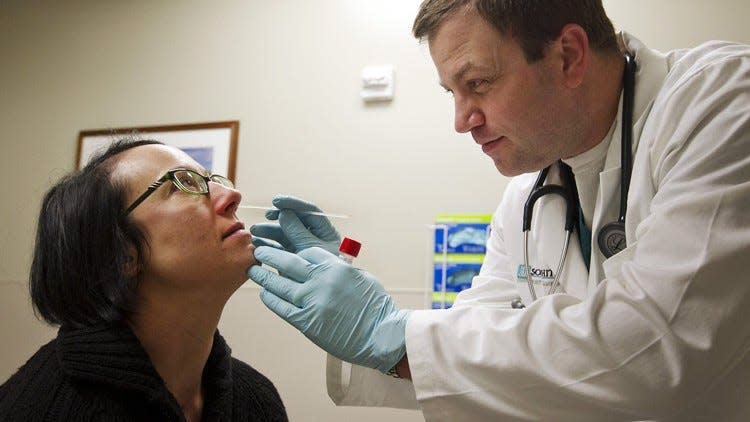'A terrible year': Austin area battling a particularly rough cold and flu season
- Oops!Something went wrong.Please try again later.
Cold and flu season came early to Central Texas this year. Cases of respiratory syncytial virus — commonly known as RSV — also began filling emergency rooms and hospital beds in October just as flu season kicked off.
As of Tuesday, the Central Texas hospital region had no pediatric intensive care unit beds or adult intensive care unit beds available, according to the Texas Department of State Health Services.
This week, the percentage of positive RSV tests in Central Texas was hovering around 17%, about twice the state's number, according to the Texas Department of State Health Services.
Flu tests have been coming back at 25.16% positive in Travis County, according to Austin Public Health, and 8.87% of all visits to doctors were for flu-like illnesses, Austin Public Health reports. The state has shown slightly higher flu positivity rates. Locally, doctors are seeing more flu A than flu B, but they are seeing both.
COVID-19 is also back on the rise. The federal Centers for Disease Control and Prevention still lists all Central Texas counties in the green level as far as COVID-19 spread and hospital availability, but the positivity rate of tests has increased. This week in Travis County, it was 11.62%, which is up almost 3 percentage points from the previous week. Texas rates were not as high. Those are just the tests that are taken at clinics, hospitals or pharmacies. The rates don't count home tests.
No room at the ICU: Children's hospitals in Austin, across Texas battling surge in respiratory viruses
The trifecta of diseases has been hitting hospitals, especially pediatric hospitals, hard all fall.
St. David's Children's Hospital in October reported that its staff has sometimes struggled to find enough beds for the children who need to be admitted, said Dr. Renee Higgerson, medical director of inpatient pediatrics and pediatric critical care at St. David's Children's Hospital and the Pediatrix group medical director.
"When we're looking for ICU beds, we're calling all the hospitals in the region," she said. "They're all full."
When Dell Children Medical Center's opened a new bed tower on Nov. 8, Deb Brown, chief operating officer at the hospital said, "In the last 24 hours, we have had a record volume in our hospital."
The hospital has been running at capacity because respiratory viruses including RSV and flu, said Dr. Leah Harris, the interim president of the hospital and chair of pediatrics at Dell Medical School. "Right now is our pandemic. The hospital is full. We are needing more beds."
'Able to save more lives':'Able to save more lives': Dell Children's expands capacity with new tower
Why is it so bad?
Usually at this time of year, the local flu positivity rate is around 10%, said Dr. Luci Leykum, chief clinical officer at Austin's Harbor Health medical practice. "It's a terrible year," she said of flu, and RSV in the community is much higher than in a usual year, she said.
For two years, people wore masks or weren't out and about as much. We skipped the flu season as well as the RSV season mostly because we weren't around it.
This year, it has caught up to us as masks have come off, people are congregating more, and we don't have the immunity built up from previous years.
"It is telling us something about just the level of immunity that develops from being around stuff more," she said.
Leykum also says our flu vaccination rates are lower than usual, whether that's because of vaccine hesitancy or a warmer fall that made people forget to get their flu shot.
As predicted: Flu season in Austin area could be a bad one, doctors say
How do you know if it's flu, COVID-19 or RSV?
Without testing, you can't be sure about which virus you might have. The respiratory viruses of flu, COVID-19 and RSV have similar symptoms. And, this year, Leykum is seeing people with more than one virus, such as flu and COVID-19, at the same time.
She is predicting that this winter, we will see a lot more co-infection of flu and COVID-19 than in previous years, which saw about a 2% to 5% rate of co-infection.
When people come to her with fever, cough, congestion, fatigue, body soreness, etc., Leykum is testing for both COVID-19 and flu, as well as using context around what they might have been exposed to.
With COVID-19 and flu, there are antivirals that can be taken to lessen symptoms and shorten the duration.
"For flu and COVID, we have treatments, which are effective if you start taking them early. For RSV, we have nothing but supportive care," Leykum said.
Staying healthy: Flu season has arrived in Austin. Here's what you need to know
There are some differences in these viruses.
Respiratory syncytial virus and other respiratory viruses have these symptoms: runny nose, coughing, sneezing, fever, wheezing and decreased appetite.
Flu has these symptoms: fever or chills, cough, sore throat, runny or congested nose, muscle or body aches, headache, fatigue and sometimes vomiting or diarrhea.
"Flu tends to hit you like you ran into a wall," Leykum said. It comes on quicker than COVID-19 and generally the fever is higher. With flu, people tend to have more body aches and muscle soreness.
COVID-19 symptoms are typically fever or chills, cough, shortness of breath or difficulty breathing, fatigue, muscle or body aches, headache, new loss of taste or smell, sore throat, congestion or runny nose, nausea or vomiting, and diarrhea.
COVID-19 tends to ramp up over the course of a couple days. "There's still a huge range in the severity of people's symptoms," Leykum said.
What about cedar fever?
Cedar fever is actually an allergy caused by the male Ashe juniper trying to seduce the female Ashe juniper tree by spreading pollen everywhere in December and January in Central Texas.
It can make you feel miserable, much like you have a virus, but the symptoms are different.
People with allergies typically have itchy or watery eyes, puffy eyes, itchy throat, sneezing, runny nose or congestion, and a sinus headache. Allergies can also worsen asthma symptoms.
Viruses like flu, RSV and COVID-19 don't have the itchiness, though some people with COVID-19's omicron variant did experience scratchy throats.
Unlike viruses, allergies typically do not produce a fever unless a sinus infection develops.
Allergy aware: Itchy, sneezy, miserable. Austin braces for arrival of an unwanted guest: cedar fever
Anything else going around?
Leykum is also seeing a stomach bug with diarrhea.
Strep, which is also common this time of year, has not been in heavy rotation.

Where should you go for testing and treatment?
Call your primary care doctor to see if you can get an appointment. Many have been booked up lately, but calling early in the day helps.
If you can't get in, check with your insurance to see which urgent care clinics it will cover. Often urgent care clinics let you book an appointment online so you don't spend your day waiting in the waiting room.
You should head to the emergency room if you are having trouble breathing or you are wheezing. If you are feeling so sick that you cannot eat or drink, you also need to go to the emergency room to get fluids.
New health care:Past Dell Medical School dean 'disrupting' primary care with new Harbor Health
Which medications can you take?
Treat the symptoms, but stay away from the combination over-the-counter products, said Dr. Jodie Pepin, clinical pharmacy program director at Harbor Health and a clinical assistant professor of pharmacy at the University of Texas.
Often those products have multiple ingredients that a person might already be taking, or they can't get enough of the product they really need, she said.
Another problem with many of the combined medications is that they have diphenhydramine, which is the antihistamine in Benadryl. If someone takes them, "they might be groggy and fall," she said. Or if they were already taking an antihistamine, she said, it could be "take this, it will knock you out, but you might not wake up."
She also recommends the generic forms of medication because of the cost-savings with the same effectiveness.
Upper respiratory infection: Take guaifenesin; it's what is in plain Robitussin and Mucinex. It's an expectorant that will help prevent things from settling in the lungs, avoiding a post-viral infection such as pneumonia. Use a cold mist humidifier to help keep the chest and nasal passages clear and moist. Do not use a hot humidifier, which can grow bacteria.
Cough: Take Delsym, which is dextromethorphan. It's a cough suppressant that will last 12 hours.
Sore throat: Keep it moist with numbing sprays such as a Chloraseptic. Use lozenges like Cepacol or other cough drops. Pepin also recommends things like chicken soup and hot tea with honey and lemon.
"For most of these ailments that people have, food is medicine," Pepin said. "Those grandparents of ours knew something."
Avoid milk products such as ice cream and milkshakes. Those can increase phlegm production.
Home remedies: Can taking elderberry syrup prevent or reduce the flu?

Fever: "For a healthy human, it's OK not to take something," Pepin said. "If I have a fever, I let myself have a fever. That's your body's response."
If you're particularly uncomfortable, you can take ibuprofen (Advil) or acetaminophen (Tylenol). You also can alternate them, taking one every four to six hours then the other the next four to six hours. They work differently. Ibuprofen is an anti-inflammatory. Acetaminophen is a pain reliever.
Diarrhea: Take Imodium (loperamide) or Pepto Bismol (bismuth subsalicylate), which is also good for nausea.
COVID-19 and flu: If you know you've been exposed or you're in the first 48 hours of COVID-19 or flu, there are antivirals a doctor can prescribe: Paxlovid for COVID-19 and Tamiflu for flu. They can shorten the course of the illness or lessen the symptoms.
Some pharmacies have had difficulty stocking Tamiflu, especially the children's version, but manufacturers are expected to catch up by mid-December. You might need to call around to find a pharmacy with it.
Immune system boosters: Some vitamins can help. Pepin recommends B-complex vitamins, especially ones with B12, and vitamin C. Packets like Emergen-C and Airborne are fine to take because they have all those vitamins in them and are convenient. Some people like to take zinc as well, which can work, but avoid taking too much because it is a metal.
Allergies: Pepin recommends what she calls the Austin trifecta of over-the-counter allergy medications: A nasal spray like Flonase (Fluticasone), Singulair anti-inflammatory pills (montelukast) to prevent wheezing if you're susceptible to that, and a nondrowsy antihistamine like Zyrtec (cetirizine) or Claritin (loratadine).
Prepare for the season: Stock the medicine cabinet for kids during cold, flu and allergy season
What can you do to prevent getting sick?
Doctors suggest getting a flu shot and a COVID-19 vaccine or booster. It will take about two weeks to reach protective levels, but "it's not too late," Leykum said. "Winter can be long."
Remember all those basics we learned with COVID-19: Wash your hands often, wear a mask in crowded spaces, get tested if you have symptoms or have had direct exposure, and stay home if you are sick.
Can we gather for Christmas?
"I think people are going to gather," Leykum said. "People are understandably just tired of it," she said of COVID-19 isolation.
If you're planning a big gathering, she recommends taking precautions leading up to the event and not going if anyone has symptoms.
This article originally appeared on Austin American-Statesman: 'A terrible year': Austin area battling a particularly rough cold and flu season

